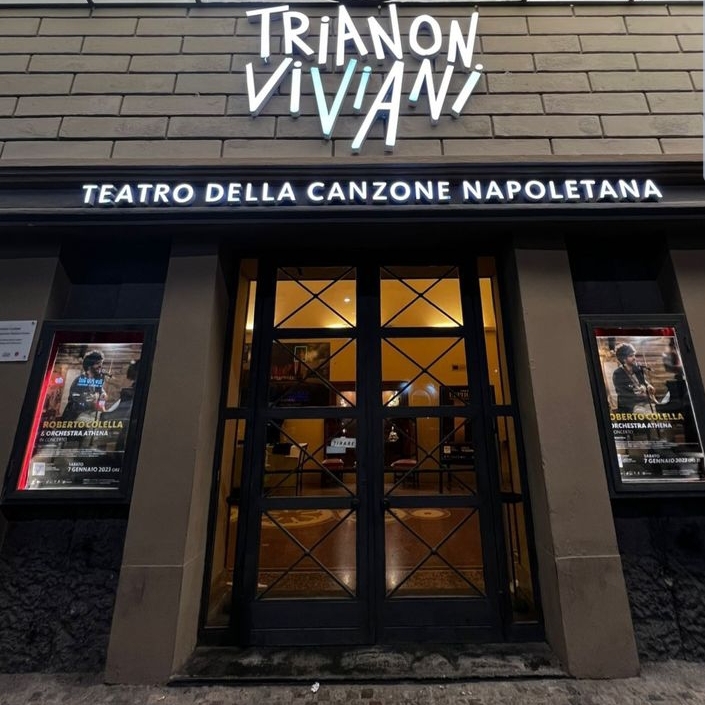Grande emozione e grande successo per il frontman della band La Maschera, Roberto Colella. Nel weekend appena trascorso, in concerto nella meravigliosa cornice poetica del Trianon Viviani di Napoli (in foto) in prima assoluta, il teatro che affonda le radici nel cuore della città, diretto artisticamente da Marisa Laurito.
Colella ha portato i suoi brani in veste sinfonica. A condividere il palco con lui l’Orchestra Athena, ensemble partenopeo tutta al femminile, nato da un’idea della direttrice Federica Di Vaio e del primo violino Emiliana Cannavale.
La voce straordinaria di Roberto Colella & la maestosità dell’Orchestra Athena ci hanno regalato vibrazioni indescrivibili all’anima. L’Orchestra è composta interamente da giovani donne talentuose che sono riuscite a trasmetterci sensazioni immense.
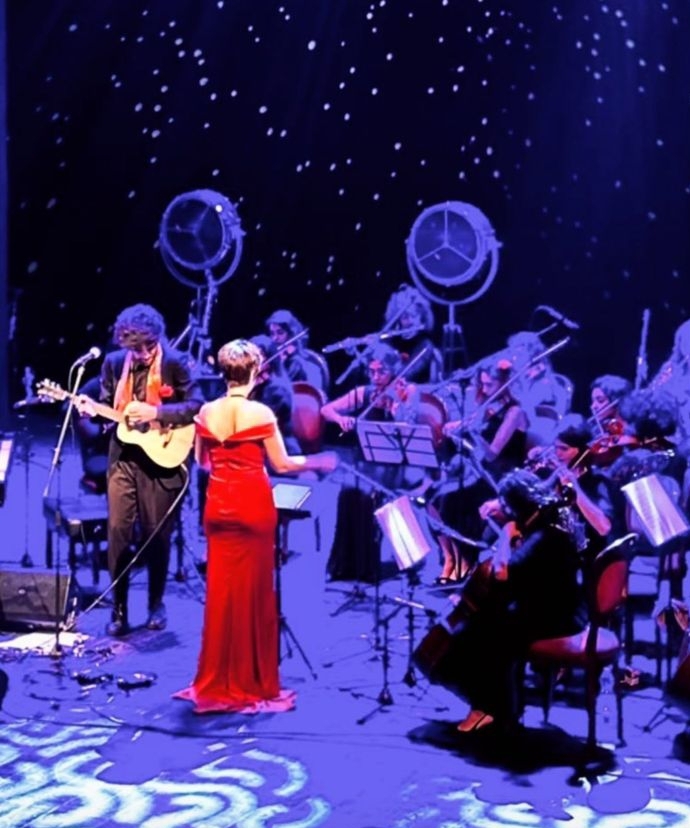
“Ah… m’arricord ‘e te guardann ‘o mare e si saglie ‘o cafè
pozz sentì l’addore, pozz sentì l’amare ‘e sta città”: È così che apre il concerto Roberto Colella, con questi bellissimi versi tratti dal brano Amarcord, dal suo ultimo disco “Sotto chi tene core” (con La Maschera). Un susseguirsi di brani, dai vecchi ai nuovi, tutti tratti dai tre album ‘O vicolo ‘e l’allerìa (2014), ParcoSofia (2017) e Sotto chi tene core (2022).
Mirella è Felice: composta a quattro mani con il conterraneo cantautore Tommaso Primo, narra la storia di Felice Pignataro e Mirella La Magna, un incontro tra sentimenti e impegno sociale da cui nasce il Gridas (Gruppo di Risveglio Dal Sonno), la Controscuola, il Carnevale di Scampia.
Seguono tante altre canzoni come Sotto chi tene core, un invito ad avere cuore, ma come molte volte ci ha detto Roberto, non soltanto cuore in quanto organo vitale, ma inteso come coraggio. Bisogna non avere paura di vivere in modo autentico: “Sotto chi tene core/e se vò spurcà ‘e mane/pe’ cercà d’essere felice/pe’ scennere d’ ‘a croce”.
Uno sguardo artistico a Thomas Sankara, ex presidente del Burkina Faso a cui è dedicata “Conosci Thomas?”, malinconica ballata su un eroe caduto e assai poco ricordato. Mentre per l’iconica La confessione si crea un’atmosfera più intimista. Un brano che narra l’ipocrisia molte volte nascosta proprio da chi si batte il petto in segno di pentimento per poi tornare sui suoi passi l’istante seguente.
E via così con N’ata musica e ‘O Marenaro: due ballad che richiamano cantautori come Eugenio Bennato e Pino Daniele senza tralasciare la forza del rock dei 24 Grana; e poi ancora Te vengo a cercà: un brano nato dall’incontro col musicista senegalese Laye Ba. Un grido di gioia generato da un abbraccio, così come ha puntualizzato Colella in una precedente intervista sul nostro portale. I versi “Chest’è Napule e nun è Africa” raccontano che ognuno è il Sud di qualcun altro.
Non poteva mancare il tributo al grande Pino Daniele con Lazzari felici. La canzone è considerata uno dei più grandi capolavori di Pino. Nel brano l’autore descrive la difficile vita del popolo nella Napoli del secondo dopoguerra. Per farlo si ispira probabilmente anche al ricordo del padre che per anni lavorò al porto, riportando alla memoria l’immagine dei lazzari, termine probabilmente di origine spagnola con il quale, a partire dal XVII secolo, venivano identificati i giovani dei ceti più poveri.
Il viaggio poetico prosegue con l’omaggio a I’ te vurria vasà pubblicata nel 1900, conosciuta a livello mondiale, considerata una delle pietre miliari della canzone napoletana.
E parlando d’amore, non poteva mancare A cosa justa. Spesso ci sentiamo forti, spavaldi, immuni al dolore, ma al contempo sappiamo che vale sempre la pena amare. Alla fine del concerto, un’ovazione: così il pubblico ringrazia Roberto Colella e l’Orchestra Athena per questo magnifico spettacolo.
©Riproduzione riservata
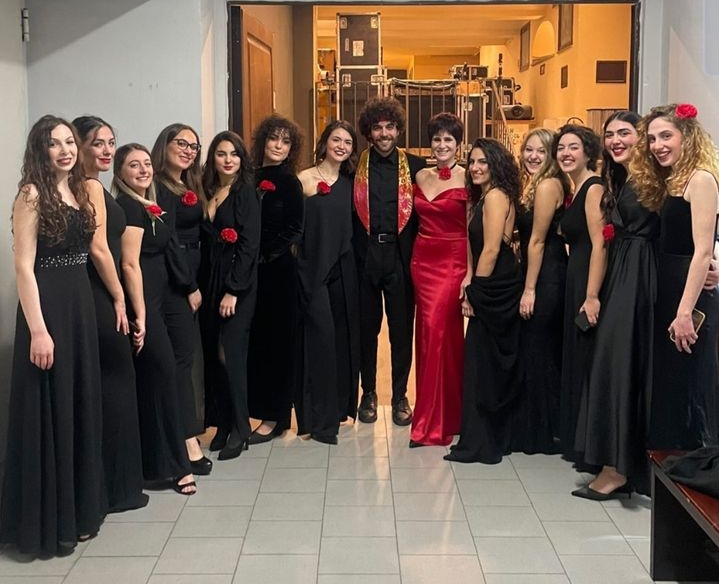
(in abito rosso la direttrice d’orchestra Federica Di Vaio)
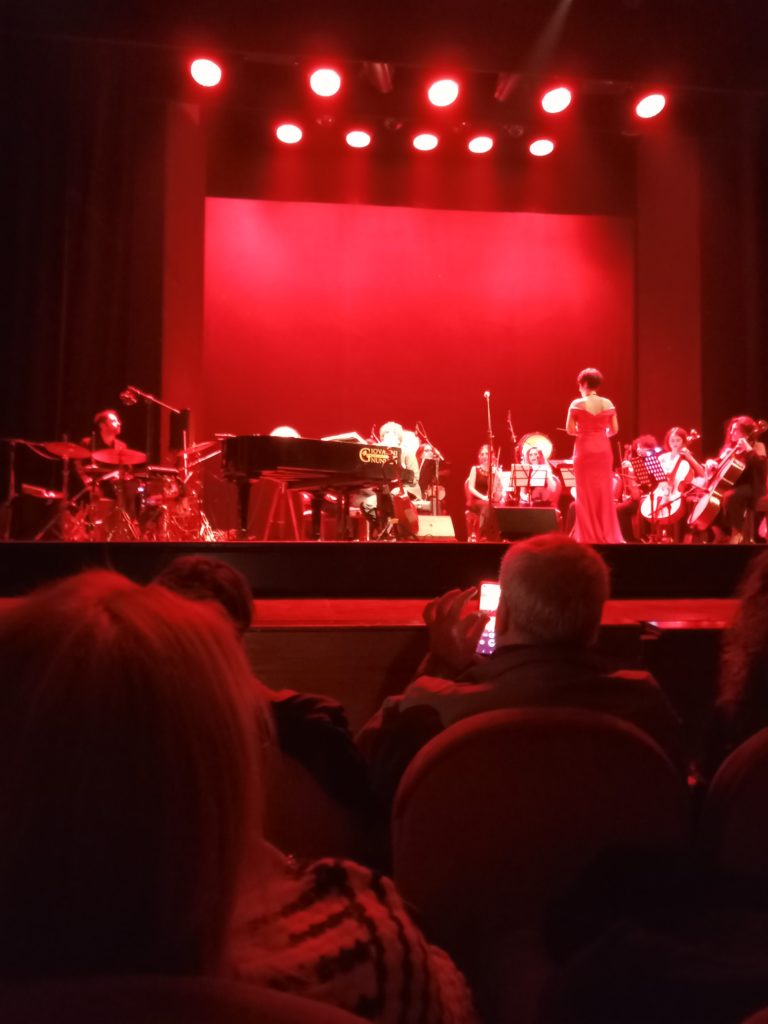
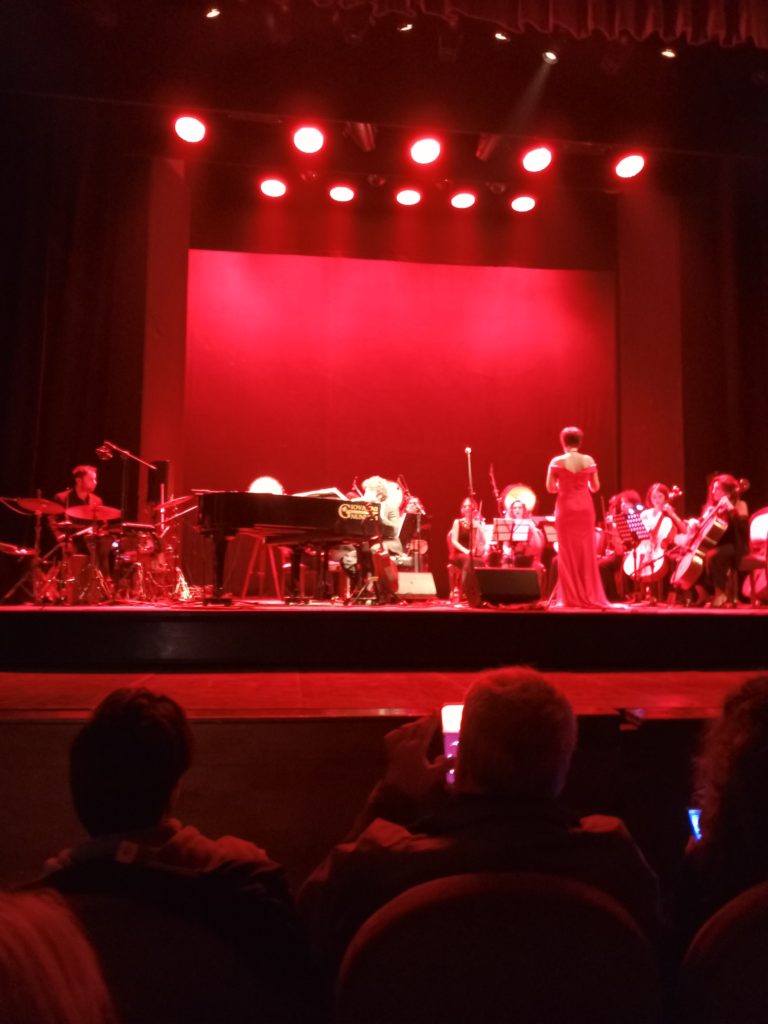
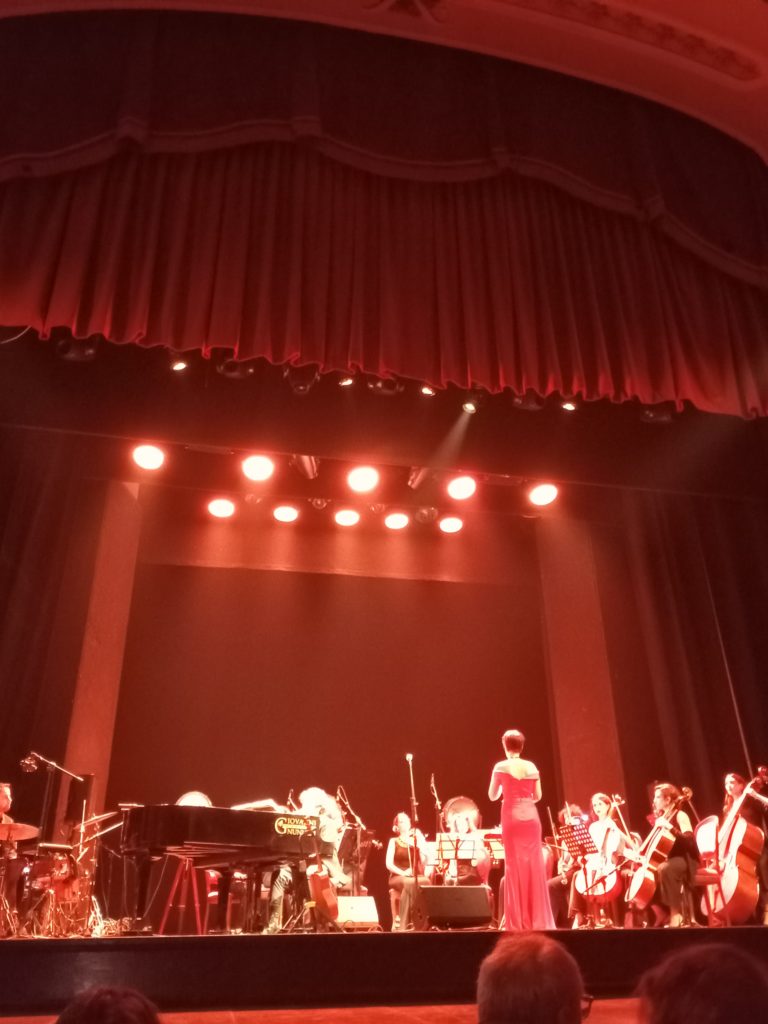
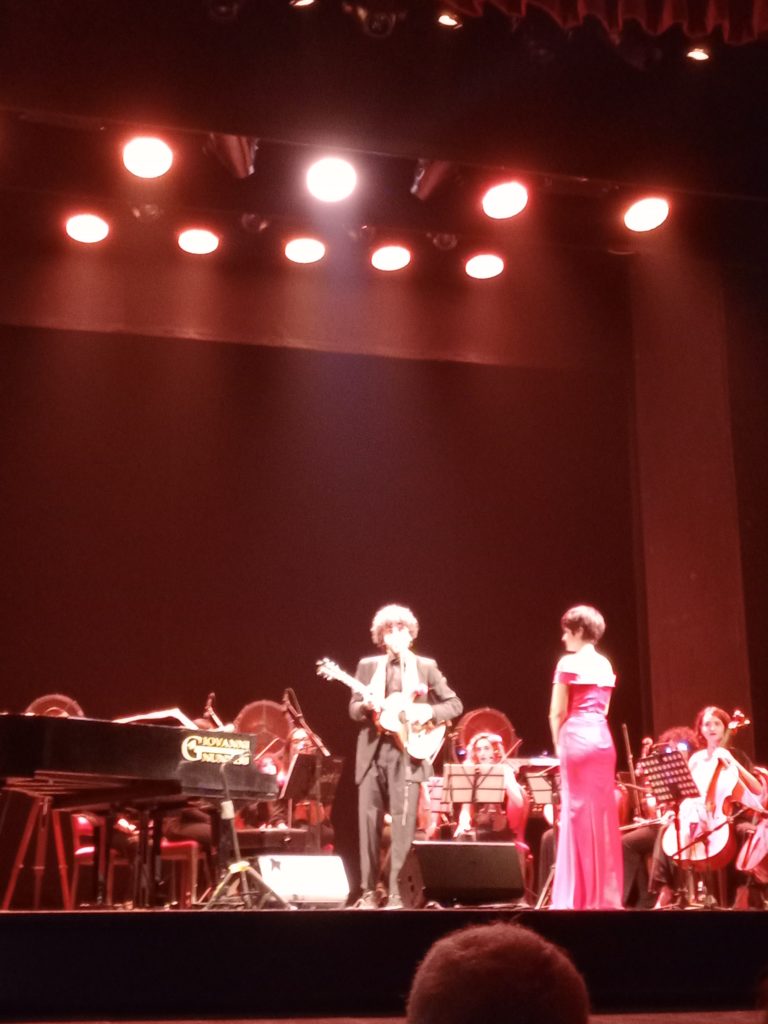
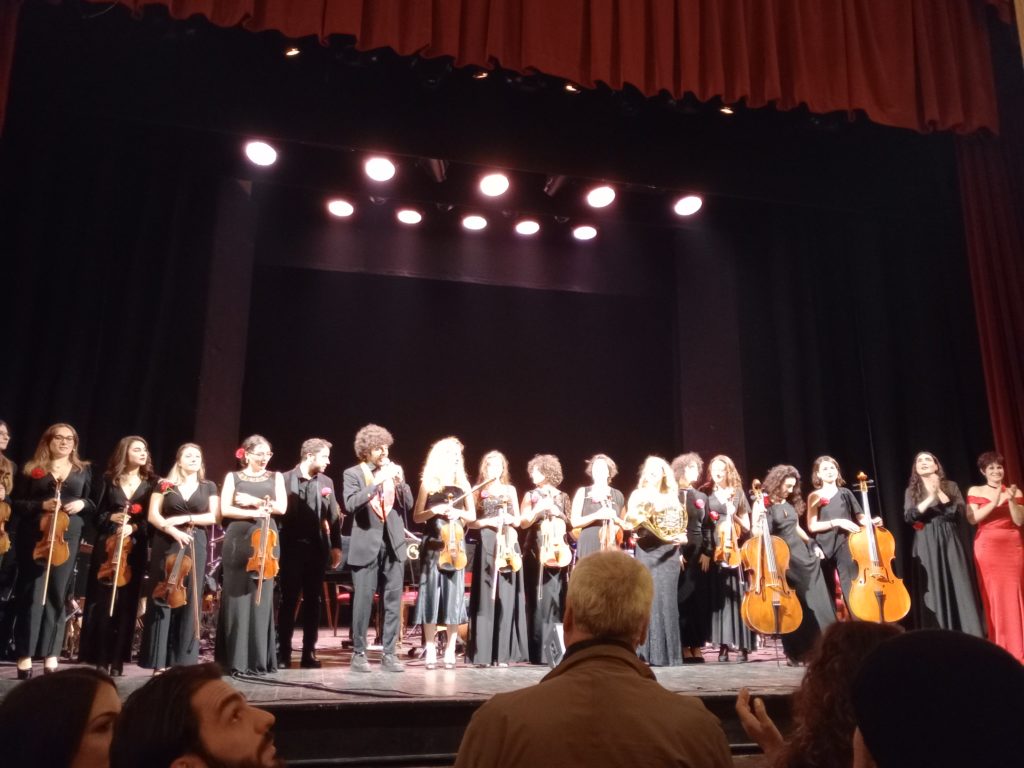
Trianon Viviani/ Great success for Roberto Colella on stage with the Athena String Orchestra: emotions triumph between Naples and the world
Great emotion and great success for the frontman of the band La Maschera, Roberto Colella. Over the past weekend, he performed in concert in the wonderful poetic setting of the Trianon Viviani in Naples (in photo) as a world premiere, the theatre rooted in the heart of the city, artistically directed by Marisa Laurito.
Colella brought his songs in symphonic guise. Sharing the stage with him was the Athena Orchestra, an all-female Neapolitan ensemble, the brainchild of conductor Federica Di Vaio and first violinist Emiliana Cannavale.
The extraordinary voice of Roberto Colella & the majesty of the Athena Orchestra brought indescribable vibrations to our souls. The Orchestra is made up entirely of talented young women who managed to give us immense sensations.
“Ah… m’arricord ‘e te guardann ‘o mare e si saglie ‘o cafè
pozz sentì l’addore, pozz sentì l’amare ‘e sta città”: This is how Roberto Colella opens the concert, with these beautiful verses taken from the song Amarcord, from his latest album ‘Sotto chi tene core’ (with La Maschera). A succession of songs, from old to new, all taken from the three albums ‘O vicolo ‘e l’allerìa (2014), ParcoSofia (2017) and Sotto chi tene core (2022).
Mirella è Felice: composed four hands with fellow countryman Tommaso Primo, it tells the story of Felice Pignataro and Mirella La Magna, an encounter between feelings and social commitment from which the Gridas (Gruppo di Risveglio Dal Sonno), the Controscuola, and the Carnevale di Scampia were born.
Many other songs follow, such as Sotto chi tene core, an invitation to have heart, but as Roberto told us many times, not just heart as a vital organ, but understood as courage. One must not be afraid to live authentically: ‘Sotto chi tene core/e se vò spurcà ‘e mani/pe’ d’essere felice/pe’ scennere d’ ‘a croce’.
An artistic look at Thomas Sankara, former president of Burkina Faso, to whom ‘Conosci Thomas?‘ is dedicated, a melancholic ballad about a fallen hero who is very little remembered. While the iconic ‘La confessione’ creates a more intimate atmosphere. A track that tells of the hypocrisy many times concealed by the very person who beats his chest in repentance only to retrace his steps the next instant.
And so it goes with N’ata musica and ‘O Marenaro: two ballads that recall singer-songwriters such as Eugenio Bennato and Pino Daniele without neglecting the rock power of 24 Grana; and then Te vengo a cercà: a song born of the encounter with Senegalese musician Laye Ba. A cry of joy generated by an embrace, as Colella pointed out in a previous interview on our portal. The verses “Chest’è Napule e nun è Africa” tell that everyone is someone else’s South.
The tribute to the great Pino Daniele with Lazzari felici could not be missing. The song is considered one of Pino’s greatest masterpieces. In the song, the author describes the difficult life of the people in post World War II Naples. In doing so, he is probably inspired by the memory of his father who worked at the port for years, bringing to mind the image of the lazzari, a term probably of Spanish origin by which, from the 17th century onwards, young people from the poorer classes were identified.
The poetic journey continues with a homage to I’ te vurria vasà published in 1900, known worldwide and considered one of the milestones of Neapolitan song.
And speaking of love, A cosa justa could not be missing. We often feel strong, fearless, immune to pain, but at the same time we know that it is always worth loving. At the end of the concert, an ovation: this is how the audience thanked Roberto Colella and the Athena Orchestra for this magnificent show.


